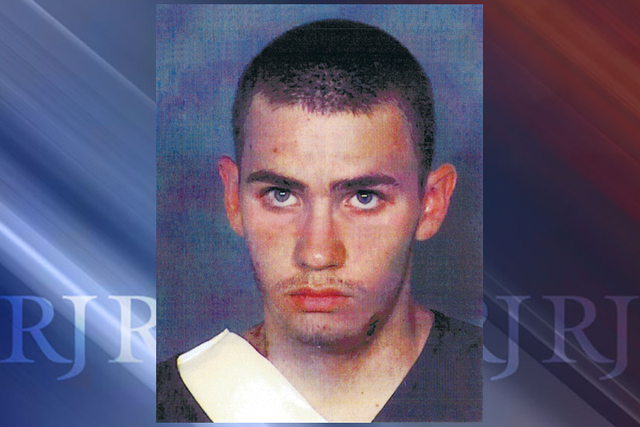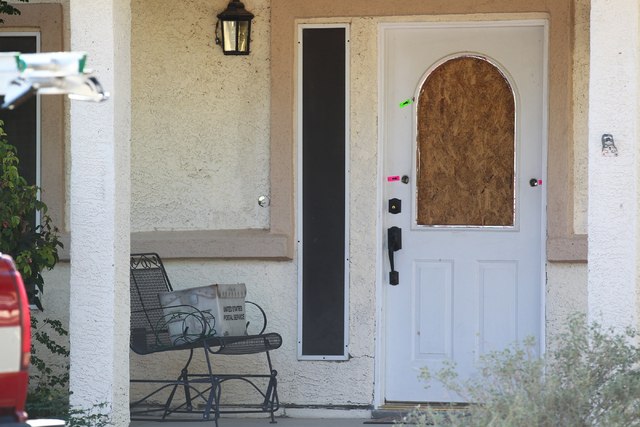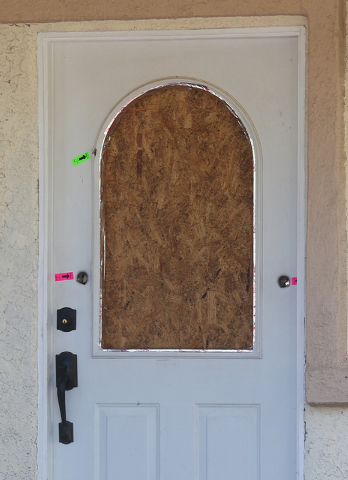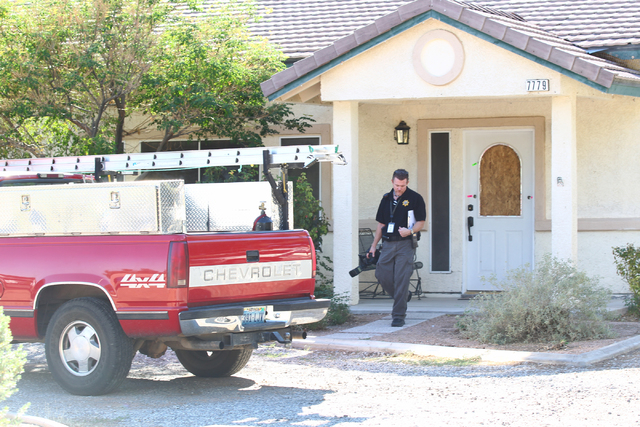Ayden McKinnon, charged with attempted murder at 14, is a boy among men in jail
Ayden McKinnon turned 15 in the Clark County Detention Center this month, a boy among killers and rapists.
Last September, the Boy Scout from far northwest Las Vegas fired two shotgun blasts through the front door of a house in the 7000 block of Maverick Street after a fallout with a friend over a girl, police say.
McKinnon was charged with 11 felonies: four counts of attempted murder, four counts of assault with a deadly weapon, two counts of discharging a firearm at or into an occupied structure and one count of attempted invasion of a home while in possession of a firearm.
Two weeks after his arrest, state law was changed to say that juvenile courts should have exclusive jurisdiction over anyone younger than 16 who is charged with attempted murder, though a judge could still decide to have teens tried as adults. This week a judge is scheduled to rule whether he is even competent to stand trial.
Earlier this month, after a panel of three justices initially rejected a request to have the case transferred to juvenile court, the Nevada Supreme Court decided to reconsider whether McKinnon should be tried as an adult.
Defense lawyer Tom Pitaro argued that the high court’s initial ruling “overlooks or misapprehends material facts and questions of law,” and that prosecutors should have told a grand jury they could consider lesser offenses based on McKinnon’s age and mental capacity.
Prosecutors disagreed and said Pitaro was raising new issues in his request for a new hearing.
There is no dispute that McKinnon’s timing couldn’t have been worse.
The change in Nevada Revised Statutes regarding teens charged with felonies was approved in 2013, well before he was charged, but did not go into effect until last Oct. 1.
“The public policy underlying this change was based on the overwhelming statistical and scientific evidence showing juveniles are much less culpable for their actions and much more likely to be successfully rehabilitated,” Pitaro wrote in court papers. “The Legislature evidenced a clear intent for not wanting children to be prosecuted as adults.”
SHIFTING PHILOSOPHY
Treatment of young offenders is at the forefront of the legal system across the country. In 2012, the U.S. Supreme Court ruled that mandatory life sentences for anyone younger than 18 was cruel and unusual punishment. This week, the court decided it would consider whether that also should apply in cases now closed.
While McKinnon is housed in a juvenile wing of the jail, with other youths also charged as an adult, he is likely the youngest person in the lockup. Isolated in his cell, he is prevented from being outside or eating meals at the same time as adult prisoners. Had he been charged as a juvenile, he would be held in an entirely different facility, the Juvenile Detention Center.
His lawyer said the youth’s future is at stake. If McKinnon is convicted as an adult, he won’t get the treatment he needs.
But prosecutors said the allegations are egregious and McKinnon, who also participated in Shadow Ridge High School’s Junior Army Reserve Officer’s Training Corps program, threatened the lives of four people he knew well.
A week before the shooting, Steve Cooper drove his son and McKinnon home from a Boy Scout hike at Mount Charleston.
According to police, McKinnon, uninvited, was back at the Cooper home on Sept. 16.
This time his head was freshly shaven, and he was wearing a black leather jacket despite the 100-degree heat. The backpack he normally carried on Scout hikes was slung over his shoulder. He cradled a loaded 12-gauge shotgun and carried a lunch box holding cash, food, camping tools and a letter to a girl.
He glanced overhead at a police helicopter responding to a call about a person with a gun, walked past the Cooper home and paused under a tree for about a minute before he crept back toward the house, according to police.
Cooper’s wife and two sons told police they were in the living room when they heard the first blast at the front door.
“Everyone was screaming,” Steve Cooper said. He yelled four or five times for everyone to “get down.”
While he called police, he told his son, Joseph, also 14 at the time, to load a shotgun.
“He couldn’t do it,” Steve Cooper told the grand jury. “He was shaking too bad. So I took it from him.”
His eldest son, Shaun, 27, later said he saw “a look of terror” in his mother’s eyes and turned to see the barrel of a shotgun outside, pointed at the window. He ran to his bedroom, grabbed his 9 mm pistol and loaded it.
That’s when a second shotgun blast hit the front door.
As McKinnon took aim a third time, Shaun Cooper fired, striking the youth in the chin and upper right chest, police said.
Metro helicopter pilot William Willson watched from 500 feet above.
“He dropped the gun and then took several steps back, maybe about 10 feet, put his hands up in the air and laid down in the dirt,” Willson told the grand jury.
McKinnon was bleeding from the face and chest. His shotgun lay on the doormat, his lunchbox in the Cooper’s driveway.
ONCE FAST FRIENDS
Joseph Cooper first met McKinnon in third grade and by fifth grade they were best friends.
But while they attended school together, their connection faded over time. In April, Joseph Cooper kicked McKinnon out of the Cooper house, and their relationship was never the same.
“It’s like not hostile, but just kind of toleration,” Joseph Cooper told the grand jury. “You know you’re not friends, but you’re not enemies.”
Joseph Cooper kept their mutual friends; McKinnon was an outcast.
“He was interested in becoming friends again,” Joseph said. “I didn’t want him to.”
They were together in band class at the end of the school day just before the shooting.
After the gunfire faded, Joseph Cooper peered toward his parent’s driveway.
“… From the lunchbox, I knew it was Ayden,” Joseph said. “I caught a glimpse of him when he was on the street and the paramedics were giving him first aid.”
McKinnon later told police he “tried to kill Joseph Cooper.” Prosecutors point to that statement as part of “a plethora of evidence of intent to kill.”
“All the steps he took before walking to the Cooper home show that this was planned and methodical,” prosecutor Nell Christensen wrote. She argues that McKinnon should be tried as adult because the state initiated prosecution before the new law took effect.
McKinnon was hospitalized for a few days after the incident while prosecutors served a notice of intent to seek an indictment. A week later a judge ordered him held on $720,000 bail, and a Clark County grand jury indicted him on Oct. 3.
Pitaro said that if McKinnon were in the juvenile system, he would be receiving treatment for autism and other mental health problems.
“The mental growth aspect is clear,” Pitaro said. “It’s the recognition that children are children.”
Addie Rolnick, associate professor of law at UNLV who specializes in juvenile justice issues, said the system has reversed course on how to prosecute young defendants facing serious charges. In the 1990s, she said, there was a push to move children to adult court.
“The juvenile system in general is built around the idea that kids are more capable of rehabilitation, to correct wayward behavior as opposed to punish,” Rolnick said. “A system that is mostly intended to provide services is a very different animal than a system that is mostly intended to punish.”
Rolnick said the walls of an adult prison could reinforce trauma on a child.
In a juvenile facility, McKinnon could receive better education, mental health treatment and intervention.
“With most kids, what’s going on with them is going to be better dealt with through treatment,” she said. “Adult jails tend to turn kids into worse criminals. That’s not to say that you wouldn’t want to punish a kid. In a perfect world we would think more carefully about why we’re doing it.”
Contact reporter David Ferrara at dferrara@reviewjournal.com or 702-380-1039. Find him on Twitter: @randompoker




















